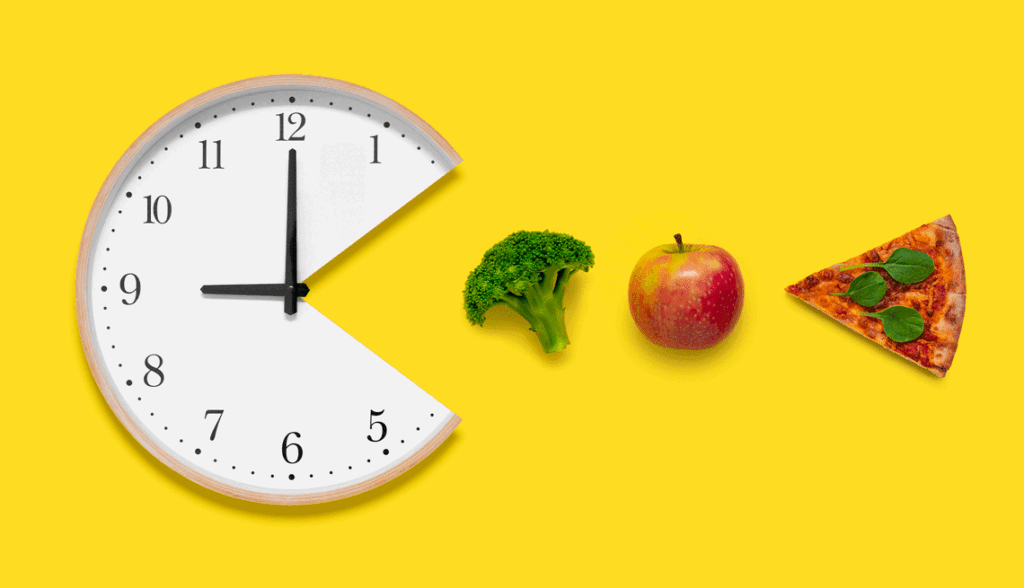You’ve probably heard people saying:
“Bro, I lost weight with intermittent fasting.”
Or, “I eat anything in my 8-hour window and still feel great.”
But what’s the real truth behind Intermittent Fasting (IF)?
Is it just another trend or a scientifically backed way to improve your health?
Let’s break it down — no fluff, just facts, benefits, and reality checks.
🍽️ What Is Intermittent Fasting?
Intermittent Fasting is not a diet — it’s a pattern of eating.
You cycle between periods of eating and periods of fasting.
🔄 Common Methods:
- 16/8 Method: Fast for 16 hours, eat in an 8-hour window (e.g., 12pm to 8pm)
- 18/6 or 20/4: Tighter windows
- 5:2 Diet: Eat normally for 5 days, reduce calories to ~500-600 on 2 days
- OMAD (One Meal a Day): Extreme version – not for beginners
No calorie counting. Just eating within a set timeframe.
✅ Real Benefits of Intermittent Fasting
1. Fat Loss & Weight Management
- Fewer meals → fewer calories
- Fasting boosts insulin sensitivity, helping your body burn fat
- Supports natural calorie restriction without constant tracking
IF can help reduce belly fat — especially when combined with clean eating.
2. Improves Metabolic Health
- Lowers blood sugar and insulin levels
- May reduce the risk of type 2 diabetes
- Increases production of HGH (Human Growth Hormone), which helps fat loss and muscle gain
3. Supports Mental Clarity & Focus
- During fasting, your body produces ketones, which can fuel the brain
- Many people report less brain fog and more energy during fasts
4. Promotes Cellular Repair
- Fasting triggers autophagy — your body’s way of cleaning out damaged cells
- Linked to anti-aging and reduced risk of chronic diseases
5. Improves Relationship with Food
- Teaches discipline and awareness
- Helps reduce emotional/boredom-based eating
- Encourages mindful eating within your window
❗The Not-So-Glamorous Truth (What No One Tells You)
1. Hunger in the Beginning is REAL
You’ll feel hungry, irritable (aka “hangry”), and tired for the first few days.
But your body adjusts within a week or two. Hydration helps.
2. Not a Free License to Eat Junk
Many people think “I fasted 16 hours, now I can eat pizza and brownies.”
Wrong.
IF works best when you combine it with nutrient-dense foods, like:
- Lean proteins
- Vegetables
- Healthy fats (nuts, seeds, ghee)
- Complex carbs (dal, oats, millets)
3. Can Affect Women Differently
Some women may experience hormonal disruptions with longer fasts.
If you feel dizzy, fatigued, or your periods are irregular, consider shorter fasts or consult a doctor.
4. Not for Everyone
Avoid IF if:
- You’re pregnant or breastfeeding
- You have a history of eating disorders
- You’re under 18
- You’re diabetic or on certain medications (talk to your doctor)
🧠 Intermittent Fasting vs Traditional Dieting
| Feature | Intermittent Fasting | Traditional Dieting |
|---|---|---|
| Calorie Counting | ❌ Not needed | ✅ Often required |
| Meal Timing | ✅ Key focus | ❌ Less important |
| Food Restrictions | ❌ Eat what you like* | ✅ Often restricted |
| Flexibility | ✅ High | ❌ Moderate |
| Long-Term Sustainability | ✅ If done right | ❌ Depends |
*within reason — quality of food still matters.
🕒 Sample IF Schedule (16/8 Method)
| Time | What to Do |
|---|---|
| 8:00 AM | Black coffee / water |
| 10:00 AM | Green tea / lemon water |
| 12:00 PM | First meal (protein + carbs + veggies) |
| 4:00 PM | Snack (nuts, fruit, yogurt) |
| 7:30 PM | Dinner (light & clean) |
| 8:00 PM | Fasting starts again |
➡️ Fast from 8:00 PM to 12:00 PM next day (16 hours)
💬 Final Verdict: Is It Worth It?
YES, if you:
- Want a simple way to lose fat
- Hate calorie counting
- Can be disciplined with timing
- Eat balanced meals
NO, if:
- You want quick results in 2 days
- You eat junk during the eating window
- You ignore your body’s signals
Intermittent fasting is powerful — but only if done correctly.
Want a beginner’s 7-day IF plan, personalized to your lifestyle?
Say “yes bro”, and I’ll hook you up with a simple schedule + food guide 🥗🕒




